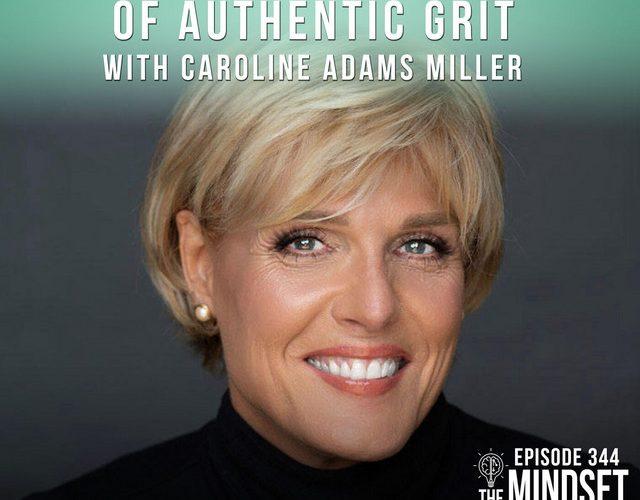September 1, 2017
By Caroline Adams Miller
One of the reasons I feel so compelled to work in the field of motivation is because I had the formula for finding success all wrong in the earlier part of my life, and I suffered greatly as a result. Through failure and an early adulthood reboot, I learned how to do what was necessary to find the right goals and summon up the perseverance to achieve them—and I developed grit in the process. My experience taught me that grit is definitely not a quality reserved for the select few; it is available to anyone who wants something so badly that they won’t let anyone stop them until they’ve gone as far as they can, often achieving or coming close to that which they sought.
Related: 6 Ways Having Grit Improves Your Life
The term I use to describe the type of grit I think elicits the greatest results is authentic grit. I define this as “the passionate pursuit of hard goals that awes and inspires others to become better people, flourish emotionally, take positive risks and live their best lives.”
Here are 10 questions to ask yourself to help you cultivate authentic grit.
1. What is the dream (or dreams) I want to pursue, and that I know I’ll regret not pursuing if I don’t get started?
It all starts with a dream. People who come to me for help have a dream to go beyond their normal boundaries to do something significant and fulfilling, something they will regret not pursuing if they never make the attempt. These are sometimes people whom others would describe as successful, who don’t necessarily have to change anything to have a comfortable existence for the rest of their lives, but who have a hunger to dig deeper and go further with a cherished goal—sometimes a hidden one.
My follow-up question to “What is the dream?” is “So what then?” What I’m trying to get at with that question is what will change in the person’s life once they accomplish that goal. “So what then?” also helps to elucidate how important the goal is to the person as opposed to anyone else close to them. If I hear the word “should,” as in “I should go to medical school,” that’s a giveaway that the person might not have what we call self-concordant or intrinsic goals. Goals that matter to you and that will keep you in the game when it’s challenging are goals that don’t matter to anyone but you. If your dream is to please someone else, including your family, then it’s not going to work.
2. What do I wake up for?
I like to ask people what they wake up for, or as the Japanese call it, their ikigai, which roughly translates to “that which I wake up for.” In the process of discussing passion, one’s purpose often emerges, but if it’s not clear, I want to hear what pulls them forward. Purpose is never about doing something just for oneself. The happiest people feel like they do something that contributes to others, and that is what gives them passion.
3. Why is this the right time to go outside of my comfort zone?
The saying “timing is everything” is true when it comes to goals. Being ready to take risks, become uncomfortable, disrupt familiar activities and break out of a safe space—either personally or professionally—will require all of the ingredients we see in grit, including passion and persistence. I’ve noticed there are several important times in a person’s life when one can take advantage of biology and natural transitions to take a leap into the unknown. Many people come to me when they have become complacent about life and want to see if they can find more excitement by pursuing a dream. Other people use the empty nest or a critical birthday—40, 50, 60, etc.—because it suddenly strikes them that life is moving forward at a rapid pace, and they didn’t realize they were stuck or unfulfilled until the milestone rolled around; psychologists have dubbed this the “fresh-start effect.” Another important time for risk-taking is when someone hasn’t found success with something else—a relationship or a job, for example—and feel like they have nothing to lose.
When I ask about timing, I also find out whether this is something the person has attempted before but not achieved. If someone has an unfulfilled urge from a previous miss, I know that it’s a dream that won’t leave them alone, and giving it their best shot is a piece of how they wish to remember themselves. People who have pursued a goal before have experience that they have learned from, experience that will help them craft new strategies for overcoming challenges. That tells me that they are resilient and have the humility to try again at something that has defeated them.
4. What’s the hardest thing I’ve ever done?
I like open-ended questions that get to the heart of what I need to know about someone, and one of the things I need to understand most is someone’s appetite for doing difficult things. You might think that many who are successful in life have overcome self-imposed challenges, but I’ve learned repeatedly this isn’t true. I have lost count of how often I’ve asked people this question and they’ve answered, “I’ve never really done anything hard.” That answer is exactly why they hire a coach. They have succeeded in spite of never going outside of their comfort zone, and they have become so accustomed to doing well that they don’t know how to cope with the risk of failing.
Related: 12 Empowering Lessons About Failure
5. How did I succeed?
For people who want to set the bar high, grit is an essential character strength, and when I coach someone who doesn’t have it, I tell them that if they want to work with me, they’ll need to do things they have never done before, such as say no to temptation and yes to constructive feedback. When someone is ready for that challenge, it’s a wonderful ride.
6. Who wants me to succeed?
This might be the most important question I ask people when assessing their likelihood for success. You can have a passion, be hardworking, curious and hopeful, but if you are surrounded by people who don’t want you to succeed or who are ambivalent about any changes you want to make, then some of our work together will need to include a clear-eyed assessment of what I call your “web of influence.”
People who succeed at long-term goals never succeed alone. They build and nurture relationships that provide support, advice and accountability. Without that supportive network, they’d never be able to regroup during difficult times and find the will to keep going. In a technologically driven society, when it’s easier to text someone than look them in the eyes, some people have let important relationships lapse or haven’t confessed their fears or goals to anyone who might be able to help them.
7. What are my top strengths?
Every single client who enters my practice takes the Values in Action (VIA) Character Strengths Survey. (It’s free and takes about 15 minutes to complete.) I find this survey to be affirming and accurate, and when I go through the results with clients, they see themselves in new and positive ways. It’s been found to boost well-being, and people who want to be persistent in goal pursuit will need to have a flourishing outlook on life if they are going to persist in hard times, handle stress with humor and resilience, and put their best foot forward whenever possible.
Researchers who study the results of the VIA among different cultures and age groups find that people who identify and use their top five strengths in positive ways throughout the day are happier and more successful in the pursuit of their goals. It has also been found that people who deliberately own their top strengths and interact with others through the prism of those strengths come across as more authentic to other people, making it easier to be around them.
8. When am I at my best, and how do my strengths emerge in those situations?
Building on the VIA, I ask all of my clients to write an essay called “Me at My Best.” In this essay, you write about a time when all of your top five strengths were used in a transformational moment or a time in your life when you were at your best. This can be a personal experience, a professional experience or both. The idea is to find a time or times when your strengths came out in the right way and at the right time to create a positive outcome. This might be a time when you made a difference in someone else’s life, when you achieved something important for yourself, or when you were going through a tough period that was made easier because you leaned on those strengths to survive and thrive.
Related: 7 Traits of the Most Resilient People
This essay is usually an aha moment for people for several reasons. Many of us take our strengths for granted and don’t realize that how we see the world isn’t how everyone else sees it. For example, people who have curiosity in their top five strengths are accustomed to asking questions and being open to new experiences. They can’t comprehend why other people wouldn’t do the same. Understanding that their curiosity is something that benefits and shapes how they interact with others becomes a powerful tool they can use to understand themselves and craft strategies to help them do hard things.
9. Who is my best possible future self?
An elegant writing exercise called “Best Possible Future Self” is a powerful way to rev up the engine of happiness and fuel the energy for goal pursuit. It is deceptively simple: People write about their life 10 years from now as if everything has gone as well as possible and their dreams have become a reality.
This exercise helps you in multiple ways:
- It unlocks a vision of who you want to become, and it’s 10 years in the future, which is an optimal time frame for contemplating the fruits of long-term labor.
- It helps you reprioritize your life, because many of us carry around different ambitions, but we don’t realize that pursuing one of them will make it impossible to accomplish another important goal.
- It puts you in touch with who you want to be in the future. It generates more hope and optimism for your future, which are essential mindsets for grit.
- By going into the future and then coming back to the present, and doing it in that order, you set up a situation called “mental contrasting.” When we visualize our ideal future, and then bring ourselves back to the present to contemplate whatever obstacles stand in our way, we are more zestful and committed to taking first steps than if we start where we are today and think about what has to happen to make our future dreams a reality, which can feel overwhelming.
10. What obstacles will I have to overcome to live my best possible life?
Once my clients have gotten their VIA strengths, pondered their purpose, explored their web of influence, examined their “Me at My Best” story and written their “Best Possible Future Self” essay, we are on our way to evaluating whether they have the grit needed to succeed. At this point, we talk about potential obstacles and what types of unexpected setbacks might come their way. If someone has tried to accomplish a goal before, then they have a good idea where they could be tripped up. So we talk about how they handled those setbacks and what they can do differently this time, including finding role models who have weathered similar setbacks and rebounded.
Although authentic grit isn’t a magic wand and won’t solve all of your problems, making it a priority is the right move for all of us. Too many of us are languishing because we are not shooting for the stars. We are settling for less than what we really want because we don’t have the inner resources—and confidence in those resources—to sit through sadness or physical pain when we need to. It’s never too late to get started down the path that will take you exactly as far as you want. Take the steps necessary to fill your life with authentic grit; you’ll have nothing but respect for yourself when you’re looking back and asking what you did to make a difference in your own life, and in the lives of others, while you could.
To read the article online, click here.




